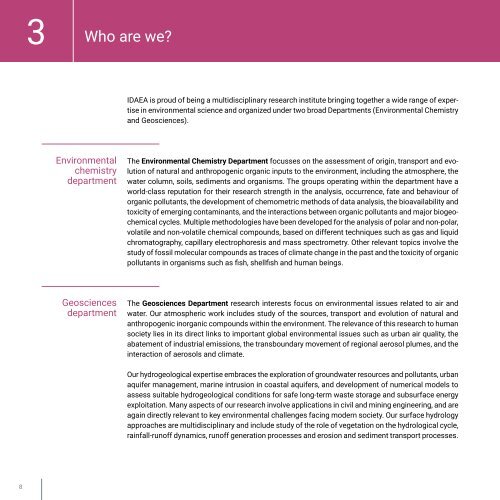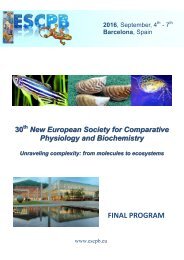IDAEA Scientific Report 2017-2018
Create successful ePaper yourself
Turn your PDF publications into a flip-book with our unique Google optimized e-Paper software.
3<br />
Who are we?<br />
<strong>IDAEA</strong> is proud of being a multidisciplinary research institute bringing together a wide range of expertise<br />
in environmental science and organized under two broad Departments (Environmental Chemistry<br />
and Geosciences).<br />
Environmental<br />
chemistry<br />
department<br />
The Environmental Chemistry Department focusses on the assessment of origin, transport and evolution<br />
of natural and anthropogenic organic inputs to the environment, including the atmosphere, the<br />
water column, soils, sediments and organisms. The groups operating within the department have a<br />
world-class reputation for their research strength in the analysis, occurrence, fate and behaviour of<br />
organic pollutants, the development of chemometric methods of data analysis, the bioavailability and<br />
toxicity of emerging contaminants, and the interactions between organic pollutants and major biogeochemical<br />
cycles. Multiple methodologies have been developed for the analysis of polar and non-polar,<br />
volatile and non-volatile chemical compounds, based on different techniques such as gas and liquid<br />
chromatography, capillary electrophoresis and mass spectrometry. Other relevant topics involve the<br />
study of fossil molecular compounds as traces of climate change in the past and the toxicity of organic<br />
pollutants in organisms such as fish, shellfish and human beings.<br />
Geosciences<br />
department<br />
The Geosciences Department research interests focus on environmental issues related to air and<br />
water. Our atmospheric work includes study of the sources, transport and evolution of natural and<br />
anthropogenic inorganic compounds within the environment. The relevance of this research to human<br />
society lies in its direct links to important global environmental issues such as urban air quality, the<br />
abatement of industrial emissions, the transboundary movement of regional aerosol plumes, and the<br />
interaction of aerosols and climate.<br />
Our hydrogeological expertise embraces the exploration of groundwater resources and pollutants, urban<br />
aquifer management, marine intrusion in coastal aquifers, and development of numerical models to<br />
assess suitable hydrogeological conditions for safe long-term waste storage and subsurface energy<br />
exploitation. Many aspects of our research involve applications in civil and mining engineering, and are<br />
again directly relevant to key environmental challenges facing modern society. Our surface hydrology<br />
approaches are multidisciplinary and include study of the role of vegetation on the hydrological cycle,<br />
rainfall-runoff dynamics, runoff generation processes and erosion and sediment transport processes.<br />
8



